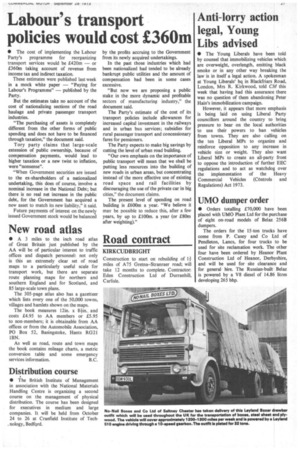Labour's transport policies would cost £360m
Page 29

If you've noticed an error in this article please click here to report it so we can fix it.
• The cost of implementing the Labour Party's programme for reorganizing transport services would be £420m — or £360m taking account of revenue from income tax and indirect taxation.
These estimates were published last week in a mock white paper — "Paying for Labour's Programme" — published by the Party.
But the estimates take no account of the cost of nationalizing sections of the road haulage and private passenger transport industries.
"The purchasing of assets is completely different from the other forms of public spending and does not have to be financed through taxation," the document said.
Tory party claims that large-scale extension of public ownership, because of compensation payments, would lead to higher taxation or a new twist to inflation, were "nonsense".
"When Government securities are issued to the ex-shareholders of a nationalized undertaking, this does of course, involve a nominal increase in the National Debt; but there is no real net increase in the public debt, for the Government has acquired a new asset to match its new liability," it said.
Future payments of interest on the newly issued Government stock would be balanced by the profits accruing to the Government from its newly acquired undertakings.
In the past those industries which had been nationalized had tended to be already bankrupt public utilities and the amount of compensation had been in some cases excessive.
"But now we are proposing a public stake in the more dynamic and profitable sectors of manufacturing industry,— the document said.
The Party's estimate of the cost of its transport policies include allowances for increased capital investment in the railways and in urban bus services; subsidies for rural passenger transport and concessionary fares for pensioners.
The Party expects to make big savings by cutting the level of urban road building.
"Our own emphasis on the importance of public transport will mean that we shall be putting less resources into the building of new roads in urban areas, but concentrating instead of the more effective use of existing road space and rail facilities by discouraging the use of the private car in big cities." the document claims.
The present level of spending on road building is £60Orn a year. "We believe it may be possible to reduce this, after a few years, by up to £100m. a year (or £80m after weighting)."












































































































